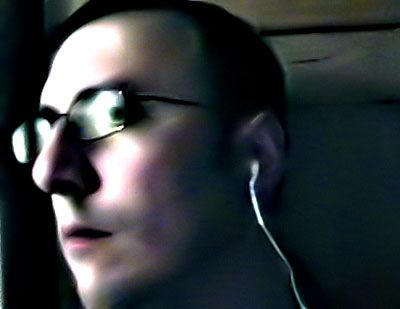Great weekend! Woke up each day in a warm, dry bed, with my woman snug beside me and my daughter down the hall in her bed, safe and warm, and hot running water. Today my daughter is at work with me, and tomorrow she starts 7th grade.
Besides that, we ate some nice meals out and saw a great movie from a few years ago, Intacto.
The problems of action vs restraint and acceptance runs through everything in our lives. It's the central crisis for everyone (and especially for addicts, which is why The Serenity Prayer is so important). This is stuff that I think of all the time, and which is central to the idea of chance and luck, explored in this movie.
In the world of Intacto, some people are luckier than others, and part of this luck is their ability to touch other (unluckier) people and steal their luck. The lucky people don't know how it works, and need to have things explained to them. This character Federico seeks out survivors of car and plane crashes and other such things and teaches them how the luck thing works, for his own ends, of course. At the beginning of the movie we see a disloyal Federico get "de-lucked" by "The Jew" Samuel Berg (a wonderful Max Von Sydow), who started his lucky streak when he survived the Holocaust and is now known as "The King of Luck." People who are lucky engage in gambling contests to see who is luckiest, with the winner of these contests eventually coming to Berg's casino, where they try to defeat him. So Federico takes our plane-crash survivor Tomas and grooms him to take on Berg, in the hopes that he will defeat Berg. Very interesting take on luck and chance and fate.
And it is a good movie to see in connection with The Pianist because that movie also deals with survival in the Holocaust came down to chance.
Intacto also works as a movie for me because it deals with the crisis faced by the world and especially by Jews after the Holocaust in a tangential way. The Holocaust is referenced, but in the words of Samuel Berg, and even then, there is no reference to death. He and other people are in a room. Every day, someone's number is called and they leave the room. We can assume they have something terrible happen to them when they leave, but we are not given details. All we know is that he is the lucky person whose number is not called. In this way, we are able to contemplate the central crisis of the Holocaust without having brutal and sadistic torture and murder re-enacted.
We are dealing with this quandary of two seemingly incompatible ideas: a universe made by and of G-d, where everything is purpose, shot through with meaning because it IS g-d, every particle, although we may not discern G-d working through our lives, versus a universe ruled by chance, where our actions, our very lives, are nothing more than the result of a series of random collisions stretching back to the first random fractions of a second after the Big Bang. How to reconcile the two?
Rabbi Barry Shafier (in one of his Schmuz lectures available as a podcast)tells a story from Talmud of a particular really saintly guy who, when really sick from a lifetime of hunger and deprivation, had a vision where he talked to G-d. The tzaddik asked G-d if he'd finally be able to have enough to eat and drink. G-d basically responded "What do you want me to do? Do you want me to turn back the world to the beginning and let everything happen again, just in case this time, things shake out a bit differently so when you are born, you end up being better off and have a life where you have enough to eat and good health?" (And I have heard another Talmud story with a similar idea. Someone wants to be rich. G-d says "sure. Show me which person I should make poor so you can be rich.")
Tuesday, September 06, 2005
Subscribe to:
Post Comments (Atom)

No comments:
Post a Comment